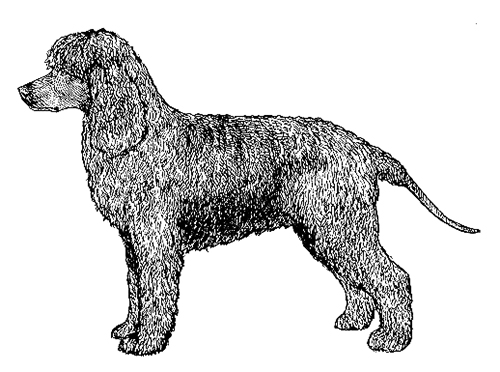Irish Water Spaniel
Gun Dog Group
The goals and purposes of this breed standard include: to furnish guidelines for breeders who wish to maintain the quality of their breed and to improve it; to advance this breed to a state of similarity throughout the world; and to act as a guide for judges.
Breeders and judges have the responsibility to avoid any conditions or exaggerations that are detrimental to the health, welfare, essence and soundness of this breed, and must take the responsibility to see that these are not perpetuated.
Any departure from the following should be considered a fault, and the seriousness with which the fault should be regarded should be in exact proportion to its degree and its effect upon the health and welfare of the dog and on the dog’s ability to perform its traditional work.
History
The exact country of origin for the breed is not clear, but the country from which the most recent foundation stock came is Ireland. Some research indicates that common ancestors include the Poodle, Barbet and Portuguese Water Dog. Recent history has the breed taking its present form in the 1830's. Its development is credited to Justin McCarthy and his "Boatswain" dog.
The breed's purpose is that of a waterfowl hunter; his strong swimming ability enables him to be physically qualified for the task. He is a quality retriever in any cover and is used for a variety of game. The breed has retained type for over 150 years, and is very popular in Ireland.
The Irish Water Spaniel has been recognized by the United Kennel Club since 1948.
General Appearance
The breed is the tallest of all spaniels. It is a solid liver color, with dense curly hair. Two identifying characteristics of the breed are its "topknot" and "rat tail."
Characteristics
Easily trained, the Irish Water Spaniel makes a good family dog, protector of the home, and obedience dog. The breed shows initiative and courage. Its overall appearance is appealing. The breed's characteristic water-resistant, curly coat needs to be groomed, but not clipped like a Poodle's. His appearance may lend to his reputation as a clown.
Head
The head is of good size and cleanly chiseled. It should not present a short, wedge-shaped or cheeky appearance. The face hair is short and smooth, but has a beard that grows in a narrow line at the back of the jaw.
SKULL
Is rather large and high in the dome, with a prominent occiput and a gradual stop.
TOPKNOT
The topknot is a characteristic of the breed. It consists of long, loose curls growing down into a defined peak between the eyes. It should not appear wig-like; that is, growing straight across.
TEETH
A full complement of strong, white teeth meet in a scissors or level bite.
MUZZLE
Long, strong and somewhat square, with a deep mouth opening and lips that are fine in texture.
NOSE
Large, with open nostrils. Liver colored.
EYES
Medium in size, and almond in shape, dark amber or dark hazel in color. Expression is keenly alert, intelligent, direct and quizzical.
EARS
Very long and lobe shaped in the leather. Set low, hanging close to the head and covered abundantly with curls.
Neck
The neck is long, arching, muscular and set strongly into the shoulders. The throat is smooth.
Forequarters
The shoulders are powerful, sloping and clean. The chest is deep, extending to the elbows.
FORELEGS
The forelegs should be well-boned, straight and muscular.
Body
The body is of good size and medium length, giving the breed a slightly rectangular appearance. The back is short, strong and level. The well-sprung ribs are carried well back. They are pear-shaped to the brisket, and rounder toward the hindquarters. The loins are wide and muscular. The body gives a barrel-shaped appearance and should not look tucked-up.
Hindquarters
The hindquarters are as high, or slightly higher than, the shoulders. They are powerful, with long, well-bent stifles and muscular thighs. The hocks are set low. The hips are wide. Well-developed hindquarters are of utmost importance since they are vital to swimming.
Feet
Large, thick and somewhat round and spreading. Well covered with hair.
Tail
The tail is set on low, giving a rounded appearance to the hindquarters.
The tail has two or three inches of curly hair at a thick base, and tapers to a fine point at the end. The hair (other than the curly hair at the base) should be short, giving the appearance of being clipped and looking like a rat's tail, which is a characteristic of the breed. The tail should not be long enough to reach the hock joint.
Color
Solid liver in color.
Serious Fault: White on the chest.
Coat
The neck, back and sides should be densely covered with tight, crisp ringlets. The hair should have natural oiliness. The forelegs are well-covered with hair in curls or waves down to the feet. Below the hocks on the hind legs, should be smooth in front, but feathered behind down to the feet.
Proper coat is of vital importance.
Gait
Smooth, free and ground-covering, with a characteristic rolling motion produced by the barrel shaped body.
Size
Males: 22 to 24 inches at the shoulders; and 55 to 65 pounds.
Females: 21 to 23 inches at the shoulders; and 45 to 58 pounds.
Disqualifications
(A dog with a Disqualification must not be considered for placement in a conformation event, and must be reported to UKC.)
Unilateral or bilateral cryptorchid.
Viciousness or extreme shyness.
Albinism.

Looking for a Dog?
Find a dog that will fit your family.
Note: The breeders on this list are not endorsed by UKC.
Revised January 1, 2007
©Copyright 1991, United Kennel Club
